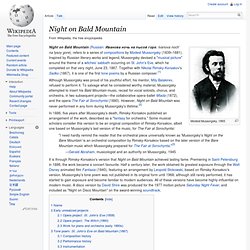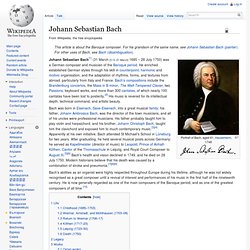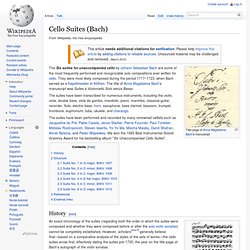

Night on Bald Mountain. Modest Mussorgsky, 1865 Although Mussorgsky was proud of his youthful effort, his mentor, Mily Balakirev, refused to perform it.

To salvage what he considered worthy material, Mussorgsky attempted to insert his Bald Mountain music, recast for vocal soloists, chorus, and orchestra, in two subsequent projects—the collaborative opera-ballet Mlada (1872), and the opera The Fair at Sorochyntsi (1880). However, Night on Bald Mountain was never performed in any form during Mussorgsky's lifetime.[2] "I need hardly remind the reader that the orchestral piece universally known as 'Mussorgsky's Night on the Bare Mountain' is an orchestral composition by Rimsky-Korsakov based on the later version of the Bare Mountain music which Mussorgsky prepared for The Fair at Sorochyntsi. Name[edit] The original Russian title of the tone poem, Иванова ночь на лысой горе, translates literally as Saint John's Eve on Bald Mountain, usually shortened to Night on Bald Mountain. Early unrealized projects[edit]
Johann Sebastian Bach. Bach's abilities as an organist were highly respected throughout Europe during his lifetime, although he was not widely recognised as a great composer until a revival of interest and performances of his music in the first half of the nineteenth century.

He is now generally regarded as one of the main composers of the Baroque period, and as one of the greatest composers of all time.[10] Life Childhood (1685–1703) At the age of 14, Bach, along with his older school friend George Erdmann, was awarded a choral scholarship to study at the prestigious St. Michael's School in Lüneburg in the Principality of Lüneburg.[19] Although it is not known for certain, the trip was likely taken mostly on foot.[18] His two years there were critical in exposing him to a wider facet of European culture. While in Lüneburg, Bach had access to St. Weimar, Arnstadt, and Mühlhausen (1703–08) In January 1703, shortly after graduating from St. In 1706, Bach was offered a post as organist at St. Köthen (1717–23) Cello Suites (Bach) The suites have been performed and recorded by many renowned cellists such as Jacqueline du Pré, Pablo Casals, János Starker, Pierre Fournier, Paul Tortelier, Mstislav Rostropovich, Steven Isserlis, Yo-Yo Ma, Mischa Maisky, Daniil Shafran, Anner Bylsma, and Pieter Wispelwey.

Ma won the 1985 Best Instrumental Soloist Grammy Award for his bestselling album "Six Unaccompanied Cello Suites". The suites were not widely known before the 1900s, and for a long time it was generally thought that the pieces were intended to be studies. However, after discovering Grützmacher's edition in a thrift shop in Barcelona, Spain, at age 13, Catalan cellist Pablo Casals began studying them. Although he would later perform the works publicly, it was not until 1936, when he was 60 years old, that he agreed to record the pieces, beginning with Suites Nos. 1 and 2, at Abbey Road Studios in London.
Casals became the first to record all six suites by 1939. Violoncello da spalla Scholars[who?] Bach - Cello Suite No.1 i-Prelude.